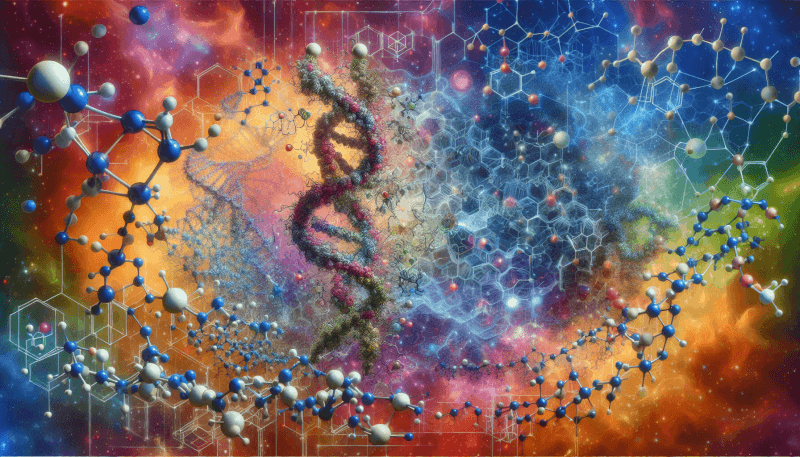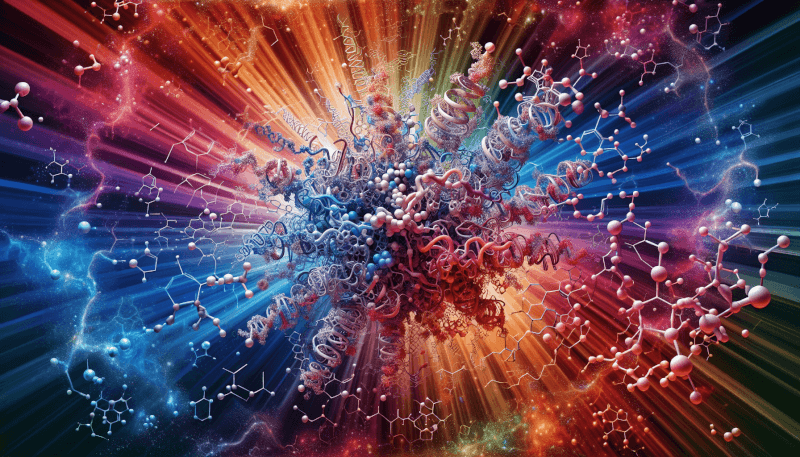You may not realize it, but proteins play a critical role in your everyday life. They are the building blocks of life, responsible for various functions within your body. From aiding in digestion and muscle growth to regulating your hormones, proteins are multitaskers that keep your body functioning at its best. In this article, we will explore the importance of proteins and how they impact your overall health and well-being. So grab a cup of tea, sit back, and prepare to gain a deeper understanding of the fascinating role proteins play in your body.

Proteins and Their Importance
Proteins are one of the essential nutrients that our body needs to function properly. They play a crucial role in numerous bodily processes and are involved in various functions that are vital for our overall health and well-being.
Proteins as Essential Nutrients
Proteins are considered macronutrients, along with carbohydrates and fats, which means that they are one of the three key components of our diet that provide us with energy. However, proteins serve much more than just an energy source. They are essential for the growth, repair, and maintenance of our body tissues, including muscles, organs, and skin.
Functions of Proteins in the Body
Proteins have a wide range of functions in the body, all of which contribute to our overall health and vitality. One of their primary functions is to act as enzymes, which catalyze chemical reactions and facilitate various metabolic processes in the body. Additionally, proteins play a crucial role in cell signaling, which allows cells to communicate with each other and coordinate different physiological functions.
Furthermore, proteins are responsible for transport and storage of vital molecules throughout the body. They serve as carriers for nutrients and oxygen in the bloodstream, ensuring that these essential substances reach their intended destinations. Moreover, proteins are integral components of the immune system, as they form antibodies that help protect the body against infections and diseases.
Structure of Proteins
To understand the functions and roles of proteins, it is essential to grasp their intricate structure. Proteins are made up of smaller building blocks called amino acids, which are linked together to form long chains.
Amino Acids and Protein Building Blocks
There are 20 different types of amino acids that can combine in various sequences to create different proteins. Each amino acid has a unique structure and side chain, which gives it distinct properties and functions. The sequence and arrangement of amino acids determine the protein’s primary structure.
Primary Structure of Proteins
The primary structure refers to the linear sequence of amino acids in a protein chain. It acts as the blueprint for the protein’s overall structure and determines its specific function. Changes or mutations in the primary structure can alter the protein’s shape and affect its ability to perform its designated role.
Secondary Structure of Proteins
The secondary structure refers to the folding and twisting of the protein chain due to interactions between amino acids. The two most common secondary structures are the alpha-helix and the beta-sheet. These structures are stabilized by hydrogen bonds between the amino acids, contributing to the protein’s three-dimensional shape.
Tertiary Structure of Proteins
The tertiary structure is the overall three-dimensional shape of a protein, resulting from interactions between amino acids located far apart in the primary sequence. These interactions include hydrogen bonds, disulfide bonds, ionic bonds, and hydrophobic interactions. The tertiary structure determines the protein’s specific function and its ability to interact with other molecules.
Quaternary Structure of Proteins
Some proteins consist of multiple polypeptide chains, each with its own tertiary structure, which come together to form a functional protein complex. This arrangement is referred to as the quaternary structure. Examples of proteins with quaternary structure include hemoglobin, which transports oxygen in the blood, and antibodies, which are involved in immune response.
Proteins in Cellular Functions
Proteins are involved in numerous cellular functions, facilitating vital processes that keep our body functioning optimally.
Enzymes and their Role
One of the most well-known functions of proteins is their role as enzymes. Enzymes are catalysts that speed up chemical reactions within the body. They play a crucial role in digestion, metabolism, and the synthesis of molecules necessary for various bodily functions. Enzymes are highly specific, and each one has a particular function and target molecule(s) they act upon.
Transport Proteins
Transport proteins are responsible for carrying molecules, such as nutrients, hormones, and gases, across cell membranes or throughout the bloodstream. These proteins ensure that essential substances reach their intended destinations in the body.
Antibodies and Immune Response
Proteins called antibodies are a vital part of our immune system. They recognize and bind to foreign substances, such as bacteria, viruses, or toxins, marking them for destruction by other components of the immune system. Antibodies play a fundamental role in defending our body against infections and diseases.
Signal Proteins
Proteins act as signaling molecules, allowing cells to communicate with each other. They transmit signals within and between cells, regulating various physiological processes, such as cell growth, differentiation, and apoptosis (programmed cell death). These signaling proteins ensure that cells work together harmoniously and respond appropriately to external cues.
Proteins in Muscle Development
Proteins have a significant impact on muscle development and play crucial roles in both muscle contraction and providing structural support.
Contractile Proteins
Contractile proteins are responsible for muscle contraction, allowing movement and mobility. The two main contractile proteins found in muscle tissue are actin and myosin. When these proteins interact, they generate the force necessary for muscle contraction.
Structural Proteins
Structural proteins provide support and stability to various tissues in the body, including muscles. One of the most well-known structural proteins is collagen, which is abundant in connective tissues, such as tendons and ligaments. Collagen provides tensile strength and contributes to the structure and integrity of these tissues.

Proteins and Energy
Although proteins are considered one of the macronutrients, they primarily serve as the building blocks for body tissues rather than a primary energy source. However, under certain circumstances, proteins can be used as an energy source by the body.
Protein as a Source of Energy
When carbohydrates and fats are insufficient to meet the body’s energy needs, proteins can be broken down into amino acids and converted into glucose through a process called gluconeogenesis. Glucose can then be used as an energy source by cells. However, relying on proteins for energy is not ideal, as it can lead to muscle wasting and impair proper bodily functions.
Protein Digestion and Absorption
Protein digestion begins in the stomach, where the enzyme pepsin breaks down proteins into smaller peptides. Further breakdown and absorption of proteins occur in the small intestine with the help of enzymes called proteases. The resulting amino acids are then absorbed into the bloodstream and transported to cells throughout the body to support various functions.
Protein Deficiency and Excess
Maintaining an optimal balance of protein intake is crucial for overall health. Both protein deficiency and excess can have adverse effects on the body.
Impact of Protein Deficiency
Protein deficiency can lead to a variety of health issues, including muscle wasting, decreased immunity, poor wound healing, and impaired growth and development in children. In severe cases, protein deficiency can result in a condition called kwashiorkor, characterized by severe malnutrition and swelling due to fluid retention.
The Role of Protein in Weight Management
Protein plays a significant role in weight management. It promotes satiety, helping you feel full and satisfied after meals, which can aid in controlling calorie intake. Additionally, protein helps preserve muscle mass during weight loss, as the body tends to break down muscle tissue for energy in the absence of adequate protein intake.

Protein Sources
Proteins can be obtained from various sources, including both animal and plant sources.
Animal Sources
Animal-based foods are excellent sources of protein. Examples include lean meats, poultry, fish, dairy products (such as milk, yogurt, and cheese), and eggs. Animal proteins are considered complete proteins, as they provide all essential amino acids in the right proportions required by the human body.
Plant Sources
Plant-based foods also contain proteins, although they may not be complete proteins and may lack one or more essential amino acids. However, by combining different plant protein sources, such as legumes, whole grains, nuts, and seeds, it is still possible to obtain all essential amino acids and meet protein requirements.
Protein Requirements
The recommended daily protein intake varies depending on factors such as age, sex, weight, activity level, and overall health.
Recommended Daily Protein Intake
The general recommended daily protein intake for healthy adults is around 0.8 grams of protein per kilogram of body weight. However, individual protein needs may vary and can be higher for individuals engaged in intense physical activity, athletes, or those recovering from illnesses or injuries.
Factors Influencing Protein Needs
Factors that influence protein needs include age, as older adults may require slightly more protein to maintain muscle health and prevent muscle wasting. Pregnant and breastfeeding women also have higher protein requirements to support the growth and development of the baby.

Protein Supplements
Protein supplements are a convenient and popular way to increase protein intake, especially for those with increased protein needs or difficulty meeting dietary requirements.
Types of Protein Supplements
There are various types of protein supplements available, including whey protein, casein protein, soy protein, and plant-based protein powders. These supplements come in different forms, such as powders, bars, and ready-to-drink shakes, providing a convenient and portable source of protein.
Effectiveness and Safety
Protein supplements can be an effective means to increase protein intake when used appropriately. They can support muscle recovery and growth, especially when consumed around exercise sessions. However, it is important to choose high-quality supplements from reputable brands and consult with a healthcare professional or registered dietitian before incorporating protein supplements into your diet.
Conclusion
Proteins are vital for numerous functions in the body and are essential nutrients that we need for overall health and well-being. They play a crucial role in growth, repair, and maintenance of body tissues, act as enzymes and signaling molecules, support muscle development and function, and contribute to various cellular functions. Understanding the role of proteins and ensuring an adequate protein intake from diverse sources can help optimize our health and support a balanced diet. Remember to consult with a healthcare professional or registered dietitian for personalized protein recommendations based on your individual needs and goals.



